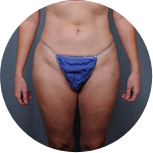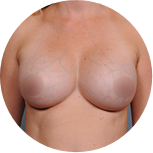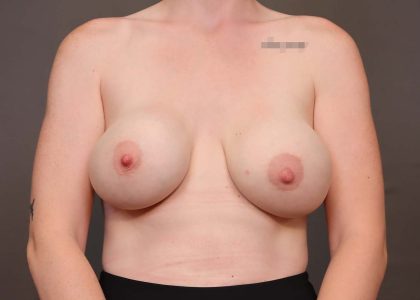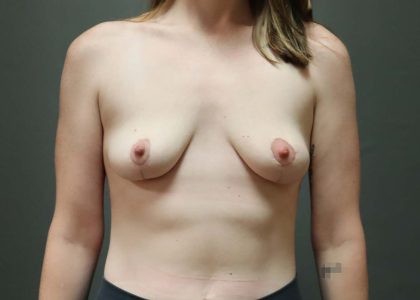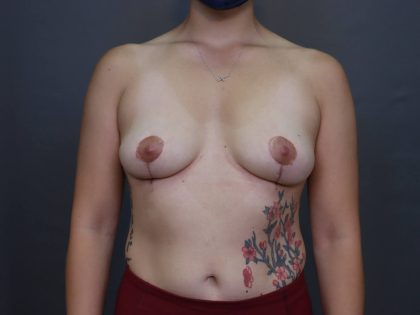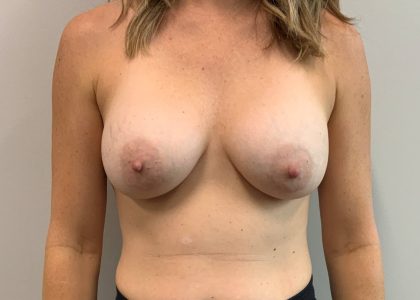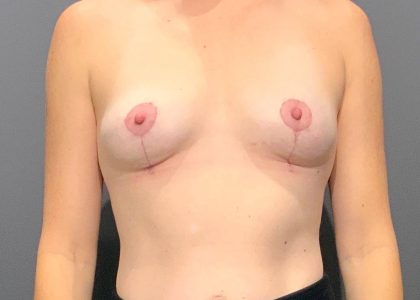Breast Implant Illness
Conveniently located to serve the areas of New Bern, NC

Breast implant illness (BII) is a category of symptoms suspected to be related to silicone or saline breast implants. Mostly self-reported by patients, these symptoms appear unrelated and often difficult to diagnose. The current medical theory is that the symptoms may be the result of a low-level chronic infection. Though studies have shown that this bodily reaction is related to bacteria and not the silicone of breast implants themselves, explantation is the most optimal and often preferred treatment strategy. Explant surgery involves the removal of breast implants and, in some cases, the surrounding scar tissue or capsule (en bloc implant removal).
Dr. John Zannis is a board-certified plastic surgeon whose technical skill is only outpaced by his compassion for helping his patients live happier and healthier lives. At Zannis Plastic Surgery, he provides patients in North Carolina and beyond with all-encompassing surgical care.
Schedule your consultation with Dr. Zannis today by calling our New Bern, NC office at (252) 633-1197, or filling out our contact form and we will get back to you as soon as possible.
Contents
Before and After Photos
What Is Breast Implant Illness?
When discussing BII, patient symptoms are often hard to place, varied, and not easily diagnosable. There is little research data that supports a connection between the slew of symptoms and silicone implants, although this does not necessarily mean that they are not connected. One of the most challenging aspects of Breast Implant Illness is its diagnosis or lack thereof. BII is hard to diagnose because there are no classic diagnostic criteria or laboratory studies to aid in diagnosis. Currently, treatment plans typically revolve around explantation to completely remove the silicone implants in hopes of alleviating the symptoms. (1)
Symptoms
In a 2021 study examining the presence of BII, around half of the included patients reported burning sensations, breast pain, and tenderness. (2)
Other related symptoms include:
- Fatigue
- Rash/Skin Irritation
- Chest Pain
- Hair Loss
- Night Sweats
- Aching Joints
- Headaches
- Sensitivity to Light
- Chronic Pain
- Muscle Weakness
- Dry Eyes
- Sneezing/Nasal Drip
If you are experiencing any of these symptoms, it is important to investigate further what their cause might be.
What Causes Breast Implant Illness?
The exact causes of BII are still under investigation. Although it is believed by some that the body’s immune response to foreign implants, such as silicone or saline, may trigger systemic symptoms in some individuals, other factors like implant rupture, bacterial contamination, or inflammatory responses are also being studied for their potential role in causing BII. As stated earlier, bacterial contamination is emerging as the leading theory.
Capsular Contracture
In the ever-growing world of cosmetic surgery, a great deal of time is spent researching the efficacy of treatments and procedures. This is especially true when they involve foreign objects, like in the majority of breast augmentations. A relatively well-known and understood complication of this procedure is capsular contracture. Whenever a foreign substance is placed in the body, it naturally produces scar tissue to protect itself and the internal organs that may surround the new object. This is exactly what happens with every patient that receives breast implants. When said scar tissue is overproduced, it can cause breast irregularities, tightness, and discomfort that can lead to the patient requesting implant removal.
Benefits of Explantation Surgery
During explantation, Dr. Zannis can completely remove the breast implant if all other diagnostic options are ruled out.
The benefits of explantation surgery are:
- Reduced pain
- Highly customizable procedure plans
- Improvement of autoimmune-like symptoms
- Improved quality of life
- More natural breast shape
It is important to remember that although explantation is the main treatment option for BII, it may not completely reduce autoimmune-like symptoms.
Candidate for Explantation Surgery
You must be in overall good health, and your breasts must be fully healed before an additional surgery to remove the implants. This reduces your chances of complications during explantation.
It is also important to have reasonable expectations and a general understanding of what explantation can do for you. You will have time to ask any questions about BII and your surgical options during your private consultation.
Personal Consultation with Dr. Zannis
Dr. Zannis will conduct a comprehensive physical examination, taking into account various factors such as the condition of your breast tissue, implant type, and overall health status. This thorough evaluation ensures that the decision to proceed with surgery is tailored to your individual needs and circumstances. The consultation will also provide a platform for discussing the pre-operative process in detail, including the surgical technique best suited for your case, anticipated results, and recovery expectations.
The long-term health benefits of explantation, such as alleviation of symptoms associated with Breast Implant Illness and improved overall well-being, will be highlighted to underscore the potential positive impact of the surgery on your health. If you are deemed a good candidate for surgery, then a member of the Zannis Plastic Surgery team will assist you with scheduling your future appointments.
Preparation
We will provide personalized information for you to prepare for your breast implant removal surgery. These instructions may include:
- Avoiding NSAIDs – Ibuprofen, aspirin, and other blood-thinning medications can cause complications during and after your procedure.
- Stopping smoking – Tobacco and nicotine constrict blood vessels, potentially slowing down the healing process.
- Avoiding alcohol – Alcoholic substances can negatively interact with general anesthesia.
- Avoiding herbal supplements – Garlic, Vitamin E, ginseng, and other herbal remedies may increase bleeding.
Before your surgery, arrange for a trusted loved one to drive you to our facilities and back home. Both explantation and breast lift procedures require IV sedation, so you will be groggy and disoriented immediately afterwards.
Procedures
Explantation (Breast Implant Removal)
Dr. Zannis performs explantation procedures for many types of patients, including those with symptoms that align with BII. This procedure can be as simple as removing the implants through a patient’s existing scars, or it can involve a more complicated procedure called a capsulectomy. Typically performed for those who have experienced implant rupture, a capsulectomy removes both the implant and its surrounding capsule to prevent further complications and improve a patient’s outcome. The most extreme removal option is called en bloc, where a layer of healthy tissue surrounding the capsule is also removed in one unit, ensuring nothing that has touched the implant is left behind.
Breast Lift
After explantation, sometimes a breast lift procedure can be performed to reshape the chest. Dr. Zannis removes excess skin from the underside of the breasts and repositions the nipples to enhance the chest contour. If you are looking for more volume after implants are removed, then he can perform fat transfer after your breast lift. This requires liposuction to remove fat from other areas and reinject it into the breasts. It is a natural and safe way to increase their size and shape.
To learn more about breast surgery, read Dr. Zannis’ blog.
Recovery & Results
For those who receive explantation surgery, recovery is similar to that of breast augmentation. Please arrange for about 1 week of downtime away from work, especially if your job requires heavy lifting or excessive movement. You may be provided a compression garment to assist with swelling and preserve your results. Please wear this according to Dr. Zannis’ instructions.
Many patients insist that their BII symptoms dissipate immediately after receiving explantation. (2) It is important to remember, however, that every patient is different and so is their recovery.
Cost of Breast Implant Removal in New Bern
Each breast explantation surgery is catered toward the individual. As a result, the cost may vary according to the treatment plan. To get a better estimate of your cost, schedule your consultation with Dr. Zannis today by calling (252) 633-1197. You may also fill out our short contact form and we will get back to you as soon as possible.
FAQ
Can I get a breast implant illness diagnosis?
Diagnosing breast implant illness can be challenging due to its varied symptoms. Medical professionals may conduct tests to rule out other conditions and evaluate your overall health before determining a diagnosis.
What are the risk factors for breast implant illness?
While any individual with breast implants may develop BII, certain risk factors may increase susceptibility. These include a history of autoimmune disorders, genetic predisposition, poor implant quality, and previous complications with breast augmentation surgery. Understanding these risk factors can help patients make informed decisions about their breast health.
Why is breast implant illness controversial?
Breast Implant Illness is a complex and often controversial topic within the realm of plastic surgery because it is not yet fully understood by the medical community. BII refers to a collection of symptoms that some patients attribute to their breast implants. These symptoms can manifest both physically and mentally, leading to discomfort and distress for those affected.
How do I keep up to date with breast implant illness research?
Ongoing research into Breast Implant Illness aims to improve understanding of its underlying mechanisms, diagnostic tools, and treatment strategies. Stay informed about the latest advancements in Breast Implant Illness research by following reputable scientific publications, attending conferences, and consulting with plastic surgeons who are actively engaged in this field.
References
- Kaplan J, Rohrich R. Breast Implant illness: a Topic in Review. Gland Surgery. 2021;10(1):430-443. doi:https://doi.org/10.21037/gs-20-231
- Cohen Tervaert J, Mohazab N, Redmond D, van Eeden C, Osman M. Breast implant illness: scientific evidence of its existence. Expert Review of Clinical Immunology. 2021;18(1). doi:https://doi.org/10.1080/1744666x.2022.2010546
